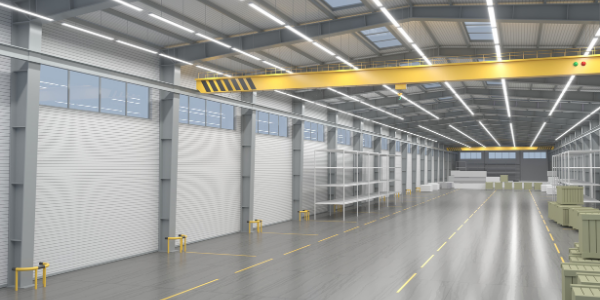Indeed, the virus has forced us to rethink our usage of space. Not only did it push us to do just about anything in the comforts of our home, from schoolwork for kids to the real work for moms and dads, but also bred a greater demand for storage space.
As the demand for masks, PPEs, and all sorts of essentials since the pandemic rose, the need for manufacturing plants and distribution centers grew by leaps and bounds. That’s a lot of space.
Now, the demand for big-box industrial space for warehouses and distribution centers is growing fueled by giant retailers. That’s a minimum of 200,000 square feet for each. Small wonder golf courses and sluggish office buildings are edged out, turning into product storage space.
If you are zeroing in on the option of building a warehouse or want to put up a manufacturing facility, then you should be doing due diligence to get the job done.
That means scouting possible locations and talking to people. Chances are you already have a plan in mind as to how your building should look like. Before you even let your construction engineer finalize the blueprints, realize that looking into the merits of a prefabricated metal building should save you a lot of trouble.
All that may not be clear to you. But worry not. Below are five key takeaways why relying on a prefabricated metal building over traditional structures could be the best business decision you can make.
Table of Contents
Quick Assembly
If you want to make the most of the current business climate, delays can certainly be your enemy. While the virus has become the central defining factor in today’s society, its reign could end anytime. Well, that should be the most awaited news for anyone on the planet.
But that could mean you’ll have to adjust your business plans. So as much as possible, striking while the metal is hot can be your best strategy right now. And constructing a building that takes months may not be ideal given that premise.
Unlike traditional methods (e.g., brick and mortar), erecting a prefabricated metal building is rather quick. It certainly won’t take months. So much, some even DIY the assembly. That’s because every building comes with a detailed erection guide. Add to the mix, assembly drawings, and getting the job done should be a cinch.
In this regard, getting in touch with a designer should be wise. Or you can connect with a reliable steel supplier. An expert supplier should help widen your building options while at the same time discuss the merits of your design.
Cost Efficiency
Right off the bat, a pre-engineered metal building is cheaper than traditional construction. That should be a great come-on for you when it comes to the business side of it.

Quite simply, you’d be up and running in no time with a lot of savings made that you can realign on other aspects of your operation. Even better, delays in construction with prefab metal are rare. That means you’d incur far less extra costs than when you decide to put up a traditional building.
Greater Durability
You may think that a prefab metal building is not as strong as one where traditional materials such as cement are used. On the contrary, durability is one of its biggest selling points.
That’s because such a construction has been proven to stand the harshest of elements. Thus, it can withstand even earthquakes or tornadoes, heavy rains, or thick snowfall. What’s more, you can have galvalume added to your steel panels to strengthen the metal and fight rust. That should increase your metal’s lifespan in the process.
As a bonus, know a metal building is basically non-combustible. That way, you need not worry about an accidental fire destroying your structure.
Energy Efficiency
To a large degree, you won’t need as much heating and cooling with a steel building. That’s because you can easily factor in better insulation compared to traditionally-constructed buildings. In the long run, you save a lot on your monthly HVAC bills.
In a way, it’s not hard to conclude a metal building is Earth-conscious. First up, it won’t cause your air conditioning or heater to work double time. That translates to a far lesser carbon footprint compared to traditional buildings. Secondly, with steel buildings, you produce far less waste than with traditional ones. That’s because you order exactly according to how many you need.
Greater Flexibility
Take note that metal buildings do not need interior columns. That spells a lot of convenience for you. You have greater leeway in designing your interior layouts.
Plus, you can enjoy greater space with a prefab metal building. As it has no minimum size, you can actually construct just about anything, from a large manufacturing facility to a sprawling warehouse in a jiffy.
Indeed, anyway you look at it, the benefits of a prefab building over traditional ones can’t be ignored. In these trying times, it’s as spot-on as it can be.
